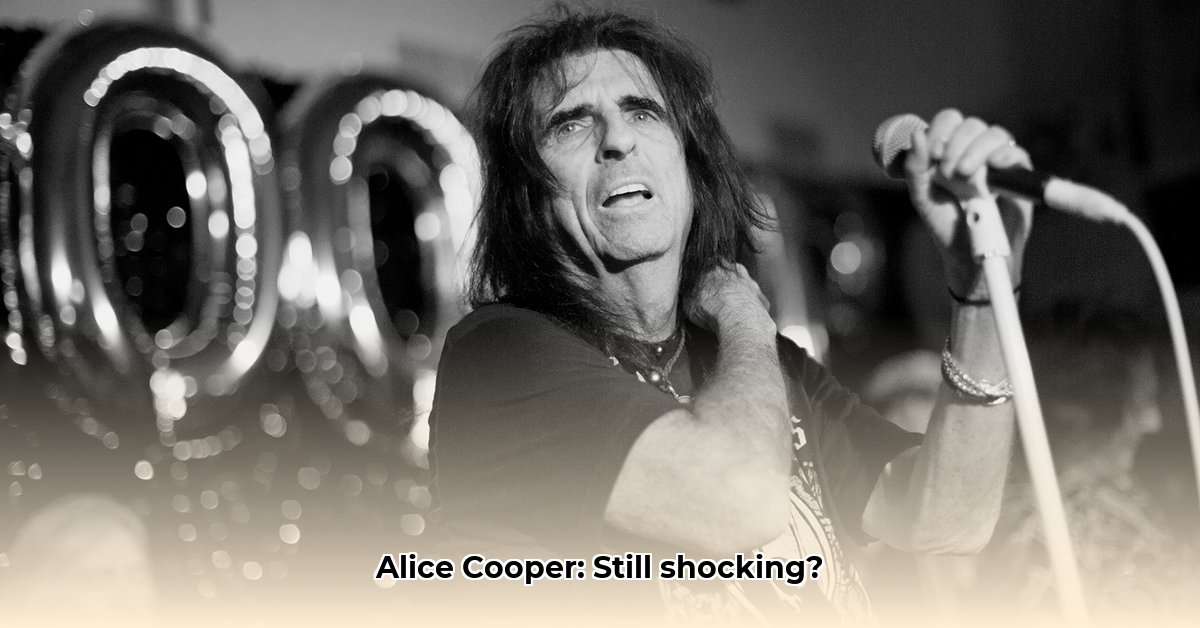
From the dusty garages of Phoenix to global stadium tours, Alice Cooper's journey is a jolting testament to reinvention and sheer staying power. It's a story far grander than just music; it's about crafting a persona, owning it fiercely, and relentlessly reinventing oneself. How did a shy kid from Arizona become a legend? Let's delve into the story of the man behind the makeup.
From Phoenix to the Planet: The Early Years
The original Alice Cooper band – not just a moniker, but a carefully constructed brand – wasn't born in a recording studio; it was forged in the grit and grime of Phoenix's underground music scene. Their sound? A potent cocktail of hard rock and theatrical antics unlike anything else at the time. Their unique blend resonated with a generation craving something different, something edgy. This risk, this gamble, paid off handsomely. The band name, eventually synonymous with their charismatic frontman, Vincent Furnier, became legendary, a testament to powerful branding. But here's the clever part: Furnier didn't just leave the band; he became Alice Cooper, a shrewd strategic move that many bands fail to execute successfully.
The Rise of Shock Rock: Guillotines, Snakes, and Stadiums
The 1970s were Alice Cooper's era of unchallenged dominance. Albums like Killer, School's Out, and Billion Dollar Babies weren't just released; they were events, catapulting him to superstardom. But it wasn't just the music—it was the experience. His concerts weren't gigs; they were fully-fledged theatrical productions. Picture this: guillotines, snakes, and enough fake blood to fill a swimming pool. This wasn't rock and roll; it was shock rock, a genre he practically invented from scratch. He wasn't merely a singer; he was a performance artist, a master showman, playing expertly with audience expectations, pushing boundaries, and defying convention. He didn't just play music; he created a theatrical extravaganza. Isn't it remarkable how he built this from essentially nothing?
The Storm and the Calm: Battling Demons and Finding Redemption
The heady mix of fame, fortune, and the rock 'n' roll lifestyle took its toll. Substance abuse and personal struggles threatened to consume him, a tale tragically familiar yet uniquely poignant in Cooper's case. But, similar to a phoenix rising, Alice Cooper showed exceptional resilience. He confronted his inner demons head-on, cleaned up his act, and staged a truly remarkable comeback. This wasn't just a career resurgence; it was a powerful testament to the human spirit's ability to overcome adversity. He proved that even the darkest periods can pave the way for a brighter, more fulfilling future. What lessons can we draw from his journey?
The Enduring Influence: A Legacy of Fear and Fascination
Alice Cooper's influence on music is undeniable. He didn't just create a genre; he paved the way for future generations of artists. Think Marilyn Manson, Rob Zombie, and countless others – all undeniably inspired by the theatrical intensity and shock value of Cooper’s work. His legacy transcends musical styles; it's about the power of performance, the ability to craft a persona that both captivates and unsettles. And the remarkable thing is – he remains incredibly relevant. His constant reinvention ensures he continues to be a major player in the music scene. Others may try to mimic his style, but none can truly capture his unique blend of menace and charisma. This is a testament to his genius.
The Secrets of Longevity: Music, Mayhem, and Malleability
What's the secret to Alice Cooper's enduring success? Some might point to his musical talent, others to his theatrical genius, and still others to his remarkable adaptability and ability to reinvent himself. It's likely a potent combination of all three – a recipe for success in any field, let alone the volatile world of rock and roll. He didn't merely create a character; he lived it, constantly evolving it to remain current and relatable. He's not just a musician; he's been a chameleon-like cultural icon. His is a story of consistent evolution.
How did Alice Cooper's born-again Christianity impact his stage persona?
Alice Cooper's faith journey didn't erase his shock-rock persona; it added a fascinating new layer. His conversion didn't diminish his creativity or stage presence; instead, it often enriched his artistic expression. This wasn't a sudden switch, but a gradual, personal transformation. It challenged the common assumptions about faith and rock and roll. His story illustrates the complex interplay between personal belief and public image. This transformation is a key part of his longevity.
Key Albums: A quick glance at some milestones in his career.
| Album Title | Year Released | Notable Features | Cultural Significance |
|---|---|---|---|
| Pretties for You | 1969 | Raw, experimental sound; hints of the theatrical approach | Shows seeds of the future Alice Cooper sound |
| Killer | 1971 | Dark, theatrical themes; strong singles | Solidified their unique sound and visual presentation |
| School's Out | 1972 | Anthemic, rebellious; iconic album cover | Became an anthem of teenage rebellion. |
| Billion Dollar Babies | 1973 | Commercial peak; refined theatrical concepts | Showcased their perfected blend of music and performance. |
| Welcome to My Nightmare | 1975 | Concept album; further development of theatrical style | Showcased Cooper’s ongoing creative evolution. |
The Show Must Go On: A Continuing Legacy
Even today, Alice Cooper continues to tour, record, and captivate audiences globally. He transcends the label of "rock star"; he's a living legend, a testament to artistic resilience and unwavering dedication. His story isn't complete; it's a dynamic narrative of reinvention, creativity, and the lasting power of a truly unique persona. The show, in its ongoing evolution, truly reflects the relentless energy of the man himself. And that, perhaps, is his greatest legacy of all.